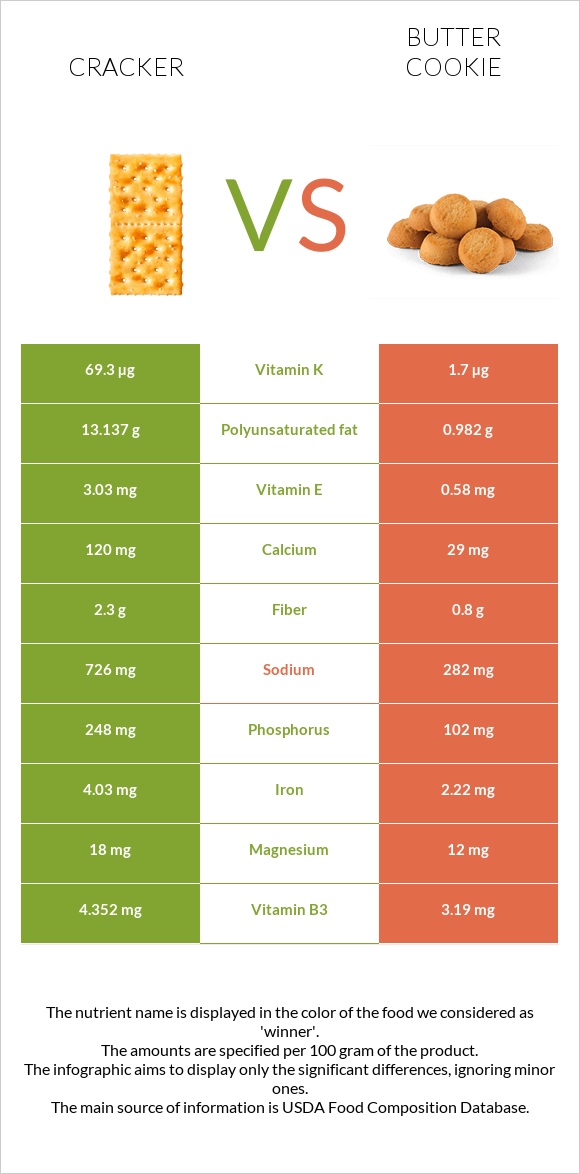Crackers vs. Butter cookie — In-Depth Nutrition Comparison
Compare
The main differences between crackers and butter cookie
- Crackers are richer in vitamin K, iron, phosphorus, vitamin E, and manganese, yet butter cookie is richer in vitamin B12 and vitamin A.
- Daily need coverage for vitamin K for crackers is 56% higher.
- Crackers contain 5 times more vitamin E than butter cookie. Crackers contain 3.03mg of vitamin E, while butter cookie contains 0.58mg.
- Butter cookie contains less sodium.
Food types used in this article are Crackers, standard snack-type, regular and Cookies, butter, commercially prepared, enriched.
Infographic

Infographic link
Mineral Comparison
Mineral comparison score is based on the number of minerals by which one or the other food is richer. The "coverage" charts below show how much of the daily needs can be covered by 300 grams of the food.
| Contains more MagnesiumMagnesium | +50% |
| Contains more CalciumCalcium | +313.8% |
| Contains more IronIron | +81.5% |
| Contains more ZincZinc | +28.9% |
| Contains more PhosphorusPhosphorus | +143.1% |
| Contains more ManganeseManganese | +188.8% |
| Contains more CopperCopper | +92.3% |
| Contains less SodiumSodium | -61.2% |
| Contains more SeleniumSelenium | +25.4% |
Vitamin Comparison
Vitamin comparison score is based on the number of vitamins by which one or the other food is richer. The "coverage" charts below show how much of the daily needs can be covered by 300 grams of the food.
| Contains more Vitamin EVitamin E | +422.4% |
| Contains more Vitamin B1Vitamin B1 | +12.4% |
| Contains more Vitamin B2Vitamin B2 | +36.1% |
| Contains more Vitamin B3Vitamin B3 | +36.4% |
| Contains more Vitamin B6Vitamin B6 | +75% |
| Contains more Vitamin KVitamin K | +3976.5% |
| Contains more FolateFolate | +21.1% |
| Contains more Vitamin AVitamin A | +∞% |
| Contains more Vitamin DVitamin D | +∞% |
| Contains more Vitamin B5Vitamin B5 | +17% |
| Contains more Vitamin B12Vitamin B12 | +∞% |
All nutrients comparison - raw data values
| Nutrient |  |
 |
DV% diff. |
| Polyunsaturated fat | 13.137g | 0.982g | 81% |
| Vitamin K | 69.3µg | 1.7µg | 56% |
| Cholesterol | 0mg | 117mg | 39% |
| Saturated fat | 5.562g | 11.051g | 25% |
| Iron | 4.03mg | 2.22mg | 23% |
| Phosphorus | 248mg | 102mg | 21% |
| Starch | 49.69g | 20% | |
| Sodium | 726mg | 282mg | 19% |
| Vitamin A | 0µg | 165µg | 18% |
| Vitamin E | 3.03mg | 0.58mg | 16% |
| Vitamin B12 | 0µg | 0.36µg | 15% |
| Manganese | 0.491mg | 0.17mg | 14% |
| Fats | 26.43g | 18.8g | 12% |
| Copper | 0.104mg | 0.2mg | 11% |
| Calcium | 120mg | 29mg | 9% |
| Vitamin B2 | 0.456mg | 0.335mg | 9% |
| Vitamin B3 | 4.352mg | 3.19mg | 7% |
| Fiber | 2.3g | 0.8g | 6% |
| Vitamin B1 | 0.416mg | 0.37mg | 4% |
| Folate | 92µg | 76µg | 4% |
| Carbs | 61.3g | 68.9g | 3% |
| Selenium | 6.7µg | 8.4µg | 3% |
| Monounsaturated fat | 6.553g | 5.522g | 3% |
| Calories | 510kcal | 467kcal | 2% |
| Vitamin D | 0 IU | 16 IU | 2% |
| Vitamin D | 0µg | 0.4µg | 2% |
| Vitamin B6 | 0.063mg | 0.036mg | 2% |
| Protein | 6.64g | 6.1g | 1% |
| Magnesium | 18mg | 12mg | 1% |
| Zinc | 0.49mg | 0.38mg | 1% |
| Vitamin B5 | 0.417mg | 0.488mg | 1% |
| Choline | 9.6mg | 6.5mg | 1% |
| Net carbs | 59g | 68.1g | N/A |
| Potassium | 118mg | 111mg | 0% |
| Sugar | 8.18g | 20.24g | N/A |
| Trans fat | 1.076g | N/A | |
| Tryptophan | 0.084mg | 0.084mg | 0% |
| Threonine | 0.193mg | 0.215mg | 0% |
| Isoleucine | 0.246mg | 0.277mg | 0% |
| Leucine | 0.471mg | 0.471mg | 0% |
| Lysine | 0.103mg | 0.308mg | 0% |
| Methionine | 0.112mg | 0.131mg | 0% |
| Phenylalanine | 0.331mg | 0.299mg | 0% |
| Valine | 0.294mg | 0.315mg | 0% |
| Histidine | 0.145mg | 0.136mg | 0% |
| Fructose | 0.29g | 0% | |
| Omega-3 - EPA | 0g | 0.011g | N/A |
| Omega-3 - DHA | 0g | 0.007g | N/A |
| Omega-3 - ALA | 1.485g | N/A | |
| Omega-6 - Gamma-linoleic acid | 0.062g | N/A | |
| Omega-6 - Eicosadienoic acid | 0.009g | N/A | |
| Omega-6 - Linoleic acid | 11.48g | N/A |
Macronutrient Comparison
Macronutrient breakdown side-by-side comparison
Protein:
6.64 g
Fats:
26.43 g
Carbs:
61.3 g
Water:
3.14 g
Other:
2.49 g
Protein:
6.1 g
Fats:
18.8 g
Carbs:
68.9 g
Water:
4.6 g
Other:
1.6 g
| Contains more FatsFats | +40.6% |
| Contains more OtherOther | +55.6% |
| Contains more CarbsCarbs | +12.4% |
| Contains more WaterWater | +46.5% |
~equal in
Protein
~6.1g
Fat Type Comparison
Fat type breakdown side-by-side comparison
Saturated fat:
Sat. Fat
5.562 g
Monounsaturated fat:
Mono. Fat
6.553 g
Polyunsaturated fat:
Poly. Fat
13.137 g
Saturated fat:
Sat. Fat
11.051 g
Monounsaturated fat:
Mono. Fat
5.522 g
Polyunsaturated fat:
Poly. Fat
0.982 g
| Contains less Sat. FatSaturated fat | -49.7% |
| Contains more Mono. FatMonounsaturated fat | +18.7% |
| Contains more Poly. FatPolyunsaturated fat | +1237.8% |





